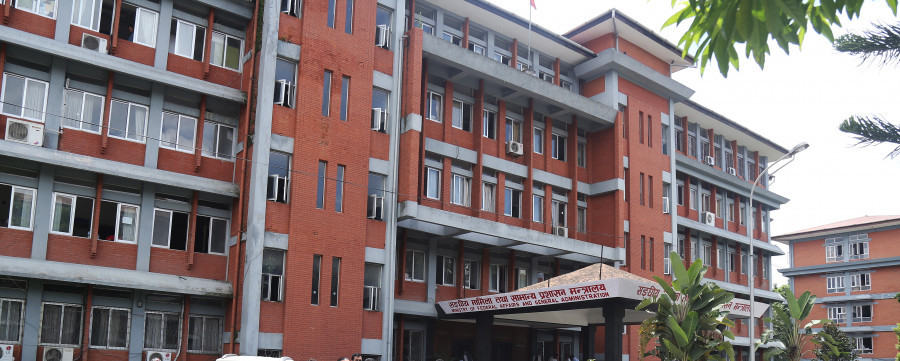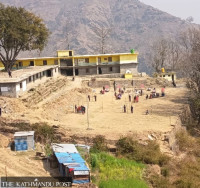National
Provincial, local governance hit as key law delayed
It has been more than two years since bill on federal civil service was registered. But passage of bills has not been a priority of the House
Prithvi Man Shrestha
Januka Parajuli, deputy mayor at Chautara Sangachokgadhi Municipality, Sindhupalchowk has to deal with complaints and disputes about matters like domestic violence, land demarcation, financial dealings and plights of elderly people among others from her constituencies.
As head of the judicial committee of her municipality, the deputy mayor is responsible for settling such matters per the section 16 (4B) of the Local Level Operation Act-2017.
But the municipality does not have any staff with knowledge of legal matters. While this has hindered her in fulfilling her responsibilities, it has also meant that the people of the municipality have not got speedy justice.
The municipality is working with a legal advisor and a legal facilitator with no legal background it has appointed on contract to help her to decide on the cases that are registered at the municipality.
“We have sent a request to the provincial public service commission demanding that the legal staff positions be fulfilled at our municipality,” said Parajuli. “As the judicial committee needs to give justice, the presence of permanent judicial staff would be more helpful.”
Dakshinkali Municipality, Kathmandu faces the same problem as Chautara Sangachokgadhi.
It too is relying on a judicial facilitator and legal advisor, both hired on a temporary basis.
“Even though they are helping me well, the appointment of permanent staff in the sector would be crucial for a functioning legal department to help the judicial committee,” said Basanti Tamang Dangol, deputy Mayor of Dakshinkali Municipality.
When civil servants were adjusted in the three layers of government—federal, provincial and local—two years ago all the legal staff came under the federal government which left provincial and local governments without their own staff to address legal issues.
But provincial and local governments have been left without not only judicial staff but also other bureaucrats to help in their functioning in the absence of provincial civil service law and local service laws.
They cannot make these even if they do not want in the absence of a Federal Civil Service Act. The laws that the provinces and the local governments make must be consistent with the provisions of the federal law,
“We have to prepare the laws based on the principle laid down by the federal civil service law,” said Shankar Bahadur K.C, secretary (law) at the Karnali Province. “But, in the absence of federal law, we have just been able to prepare a draft of a relevant bill.”
The Federal Civil Service Bill was registered at the Parliament Secretariat in February 2019. But, the bill is yet to be endorsed by the House of Representatives. It was stuck at the State Affairs and Good Governance Committee under the House of Representatives for nearly two years as the committee took a long time to conclude discussions on the bill.
“After the prolonged debate, the State Affairs and Good Governance Committee in the last session of Parliament endorsed a report on the bill and sent it to the work management committee of the lower house,” said Babita Mishra, secretary at the committee. “But the bill is yet to be presented at the full meeting of the House because the last session of the House had ended in July without the bill being tabled.”
Prime Minister KP Sharma Oli decided to suddenly prorogue the House on July 2, which meant it could not be tabled for discussions.
And 13 days before the winter session of the House should have been convened, as the constitution mandates the time between the two house sessions cannot be more than six months, Oli dissolved the House on December 20.
The Supreme Court on February 23 restored the dissolved lower house and since then the government has been more focussed on saving itself and the ongoing political disputes are taking precedence over discussions on the crucial bills, governance has taken a hit.
After the Supreme Court verdict on March 7 led to separation of the CPN (UML) and CPN (Maoist Centre) whose merger in 2018 had led to formation of Nepal Communist Party (NCP), which has been scrapped, the future of the Oli’s government remains uncertain.
The political drama is not the only factor that is delaying the passage of the bill on Federal Civil Service Act. Even if it is endorsed by the lower house, it has to be sent to the National Assembly where a separate debate regarding the bill will take place.
Meanwhile, the provincial and local governments continue to face staff crunch and many of them are relying on staff recruited on contract basis.
“As per our Organization and Management Survey, we need around 2600 staff but we currently have around 1,900 staff,” said Keshav Prasad Upadhyay, spokesperson at Chief Minister’s Office, Karnali Province. “We have hired some technical staff such as overseers, engineers and veterinary staff on contract.”
Besides lack of federal law, there has also been a delay in formation of Provincial Public Service Commission in Karnali Province from making fresh recruitment of permanent staff. Only recently were the office bearers of the Provincial Public Service Commission in Karnali appointed. The delay was because the federal government delayed in the preparation of the standards for the formations of the commission and because the provinces themselves did not prioritise their formation.
But even though all the provinces have by now formed their own public service commissions most are yet to start recruitment of required staff at provinces and local levels.
Those that have, like in Bagmati and Lumbini, have done so on the condition that the services and facilities to the staff to be recruited would be based on what would be determined later by introducing provincial civil service laws.
But for the moment the recruitment has been fraught with problems.
Lumbini Province’s move to recruit 125 staff in October last year landed in court as some government employees filed writ petitions at the High Court, Butwal, and the Supreme Court.
The plaintiffs argued that the vacancy should have been for the grade 6 civil servants instead of the grade 7. They have demanded that the commission initiate a promotion process and have an open competition to fill the vacant posts.
“We had issued a vacancy notice for grade 7 considering it as an officer level position But the centre’s Federal Affairs Ministry last year had issued vacancy notice for grade 6 by categorising this as officer level post while recruiting staff for local government,” said Rajendra Thapa, secretary at Chief Minister’s Office, Lumbini Province. “It therefore created confusion among employees and our recruitment drive faced roadblock.”
According to him the Supreme Court has invited both sides of the dispute for discussion but the court date has continued to be postponed for the last several months.
“Had there been the Provincial Civil Service Act, the provincial government would be clear on whether vacancy should be for grade 6 or grade 7,” said Thapa.




 27.41°C Kathmandu
27.41°C Kathmandu














